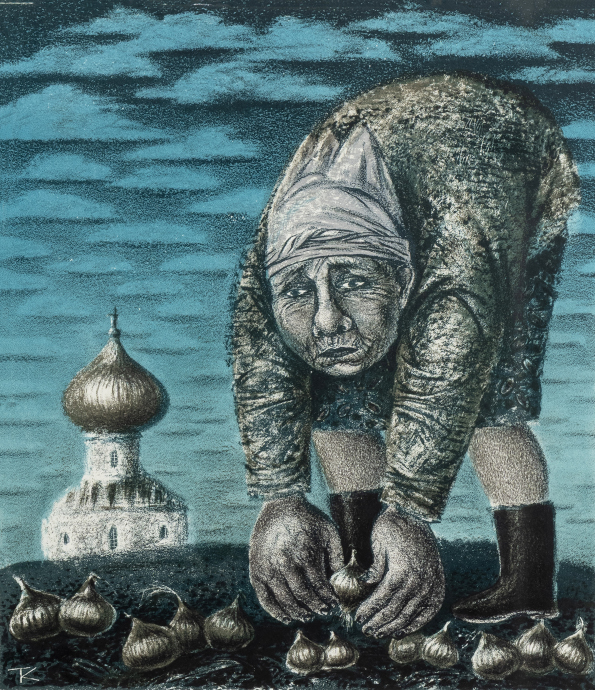Onions
Why is this website called “By the Onion Sea”?
I consider “onion” to be emblematic of Russia. In addition to being one of the ten main Russian foods, onions are brought to mind by the dome of every Russian church. On the wall of my office, I have a lithograph by Tatiana Kozmina, a Russian artist I like, called “Lukovka” (“Onion Head”).
The picture has become a powerful symbol of Russia for me. The Russian word for an onion is “luk” (pronounced like “look” or “Luke”). The title of the website is taken from a mistranslation of the famous prologue to Alexander Pushkin’s “Ruslan and Ludmila” (1820), which most Russian kids memorize by age 6 or 7:
У лукоморья дуб зелёный;
Златая цепь на дубе том:
И днём и ночью кот учёный
Всё ходит по цепи кругом…
An English Translation:
An oak tree greening by the ocean;
A golden chain about it wound:
Whereon a learned cat, in motion
Both day and night, will walk around…
(translated by Walter Arendt)
The oak tree is located by “lukomorie,” a beautiful and rare word that consists of two parts: “luk” (an “arc” or “bend”) and “more” (“sea”). It means “the bend of the sea.” Here is Vladimir Nabokov’s explanation in “The Art of Translation” from his Lectures on Russian Literature: ‘A national sense of humor, set into motion by the likeness between the Russian words meaning “arc” and “onion,” led a German professor to translate “a bend of the shore” (in a Pushkin fairy tale) by “the Onion Sea.”’
Reading a book is like peeling off the layers of onion skin, isn’t it? Dostoevsky’s The Brothers Karamazov comes to mind immediately when one thinks about an onion as a symbol. The novel uses it in a variety of ways, but it also includes a chapter called “An Onion” (also “Lukovka”). One of the main characters, Grushenka, tells a fable and then concludes what it means to give an onion:
“Once upon a time there was a woman, and she was wicked as wicked could be, and she died. And not one good deed was left behind her. The devils took her and threw her into a lake of fire. And her guardian angel stood thinking: what good deed of hers can I remember to tell God? Then he remembered and said to God: once she pulled up an onion and gave it to a beggar woman. And God answered: now take that same onion, hold it out to her in the lake, let her take hold of it, and pull, and if you pull her out of the lake, she can go to paradise, but if the onion breaks, she has to stay where she is. The angel ran to the woman and held out an onion to her: here, woman, he said, take hold of it, and I’ll pull. And he began pulling carefully and had almost pulled her all the way out, when other sinners in the lake saw her being pulled out and all began holding on to her so as to be pulled out with her. But the woman was wicked as wicked could be, and she began to kick them with her feet: ‘It’s me who’s getting pulled out, not you; it’s my onion, not yours.’ No sooner did she say it than the onion broke. And the woman fell back into the lake and is burning there to this day. And the angel wept and went away.”
Grushenka then says that “in my whole life I’ve given just one little onion,” and the theme goes on through the whole book. “I may be wicked, but still I gave an onion” is considered one of the most famous quotes from Dostoevsky (translated by Richard Pevear and Larissa Volokhonsky).
Onions get in the list of 10 main Russian foods; and it is poor person’s food. In Gogol’s “The Nose” the barber tells his wife regarding breakfast: “Today … I will not have coffee, but instead I’d like to have some hot bread with onion.”
I found an English idiom “to know one’s onions” – that means “to know one’s stuff.” Now, don’t you know your onions?



One Comment
Trackbacks
Comments are closed.